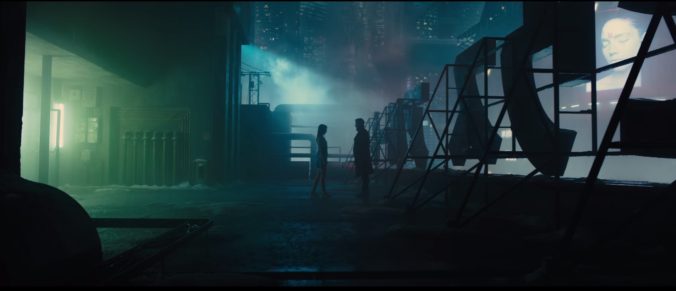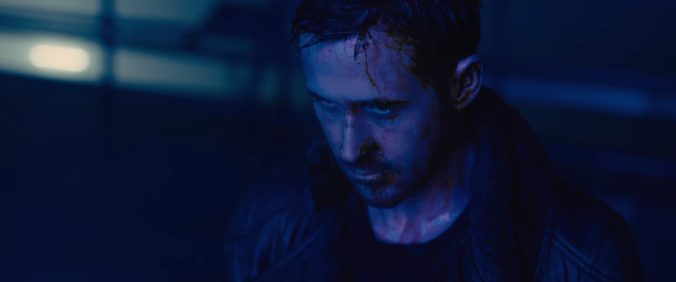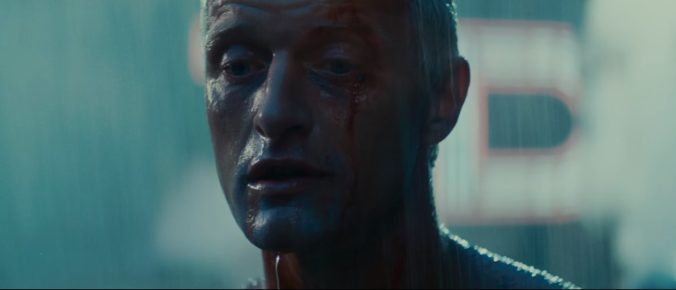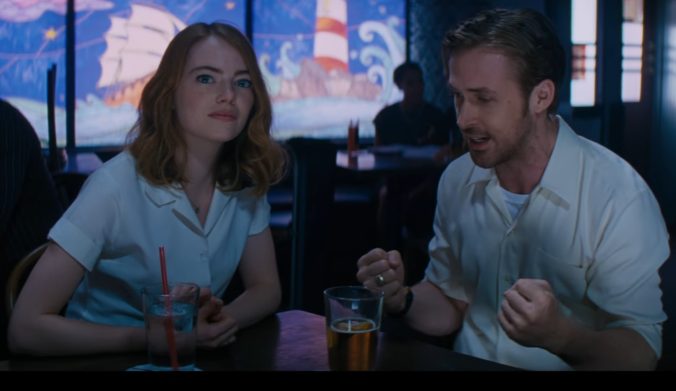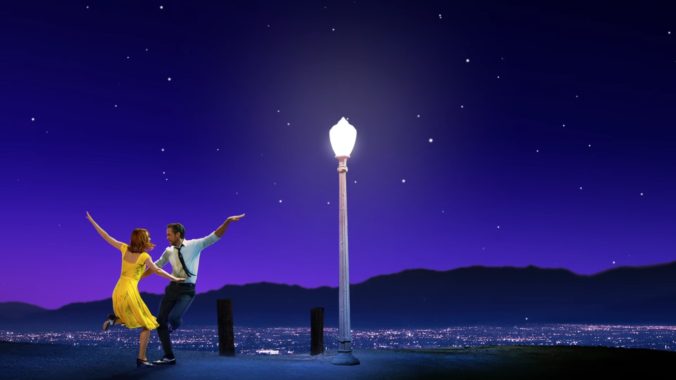For each movie in the “Denis 2049” series, Taylor and Sam will sit down and bounce some thoughts off each other, off-mic. Their brilliant minds will unleash many words. Make of them what you will. This time: “Blade Runner 2049.”
Taylor: Wow.
After weeks and weeks of build-up and hours and hours of watching and talking about old Denis Villeneuve movies, we’ve finally – truly – arrived.
“Blade Runner 2049” is here, and it’s amazing. It’s everything I dreamed of and more. I’ve seen the Lord, and his face is brightly shining!
What should we even talk about with this one, Sam? I feel like I could write 77,000 words about this movie.
Sam: I want to start from the very beginning. Partly because I know the deeper into the movie we go, the more deeply I’ll be confused, and partly because it took me approximately zero seconds to be sucked all the way into this movie (and partly because Jared Leto isn’t in this part).
Look, I came for Dave Bautista farming worms, and that’s where I want to set up shop for a couple of sentences. I could watch that life every day. Dave wakes up. Dave puts a kettle of coffee on the stove. Dave shuffles around his house with a normal-sized cup of coffee that looks tiny in his hands and puts on normal-sized glasses that look tiny on his head. Dave looks out the window at the grey landscape and taps out a couple notes from a sad but familiar riff on his sad but familiar piano. Dave bites into a strudel, zips up his hazmat suit, gets his lunch pale, and Dave goes and FARMS WORMS. Dave goes around and inspects each worm. He feeds them. He tends to them. He probably has a folding chair that he keeps in the farming tent to sit and watch his worms do whatever the hell. Occasionally, a Blade Runner comes in to retire him, and Dave buries them under his worm farm. It’s a movie all to itself.
Holy cow, is this movie stunning. I need to see it again so my senses can corroborate what I’m pretty sure I experienced. It was what I imagine heroine is like – and even though I’ve never had the luxury of purchasing an ounce (a gram? a rock?) of the liquid lady, I can’t imagine it costs any more than an IMAX ticket – and let me tell you, was worth every cent of the 200 dollars I spent to see it. We can talk about the plot if you want, but all I really remember is the way this movie felt. Like someone took the original “Blade Runner,” “The Fifth Element,” “2001: A Space Odyssey,” the Tupac Hologram, a neon light, a rock, a wool coat, the skeleton of Harrison Ford and a trumpet blast to my eardrum, and put all of it in a burlap sack and hit me over the head with it. It was perfect.
What should we talk about? I have no idea. Here are some starting points you can choose from:
– Flying cars
– Landfill orphanages
– The end of the phrase “happy birthday”
– Mackenzie Davis
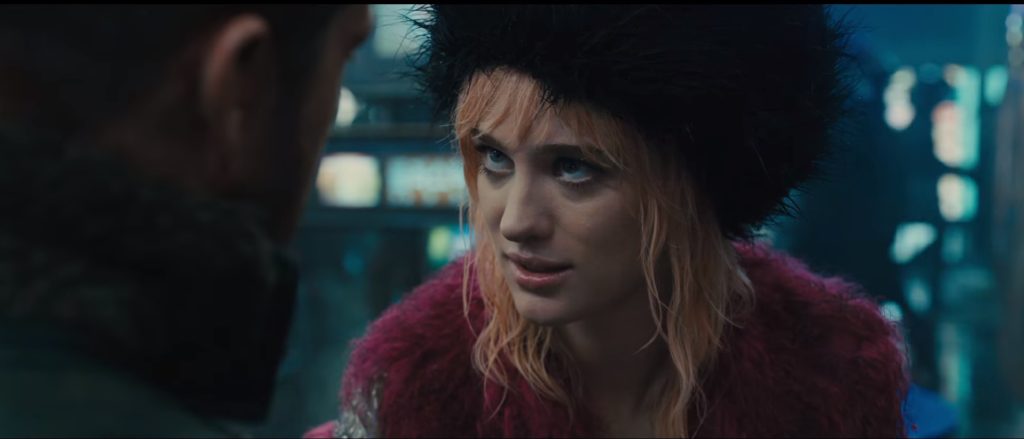
Taylor: As many words as I could write about the end of the phrase “happy birthday,” let’s save the Leto of it all for later.
For now, listen.
You hear that?
That’s the sound of someone coming to a stop and catching fire because they walked into a movie theater right as Mackenzie Davis came on the screen. As a Halt Head (who, admittedly, has not watched the final season yet), I’ve gotta take that choice and start there.
She pulls some Anthony Hopkins-level work here (in the sense that she shows up for like three scenes but makes a huge impression by virtue of being interesting, mysterious, gross, pretty, thoughtful, rude, and just an all-around great robot lady) in BR2049.
The thing about Mackenzie Davis, though, is that there’s only one thing people will really remember about her in this movie.
You know what I’m talking about.
THERE’S LIKE A 25-MINUTE SCENE WHERE SHE INHABITS THE BODY OF A PROJECTION LADY SO SHE CAN MAKE OUT WITH RYAN GOSLING! (And presumably do more after that, but idk).
This scene was the strangest, ballsiest thing I’ve seen in a “big blockbuster” movie in a long time, and sitting in a theater on opening night watching the people around me try to figure out what the f*** they bought a ticket for (and even watching some people straight up walk out at this point) was an experience that made me weirdly giddy.
What did you think of this scene, and more importantly, what did you think of Villeneuve deciding to take a movie that cost hundreds of millions of dollars and just play it out in the slowest, weirdest way possible?
Sam: I’ve never heard of Anthony Hopkins being described as “all-around great robot lady” and I have no intention of going far enough in “Westworld” to find out if he ever is one, so I’ll take your word for it.
I think Big Mac Davis – while being a robot – is arguably the most human part of BR. This movie spends 2 hours and 575 minutes exploring humanity’s most boring question: “What does it mean to be human?” But here, in Ryan Gosling’s cool-guy-futuristic-Disney-Channel-SmartHouse apartment, she dives into some of the more poignant questions about humanity and why we do what we do for a living, like, for instance, “uh…what the hell is going on and why is this taking so long?” I know that’s not literally what she said, but with her apprehensive head-grabbing and frustratingly imperfect physical synchronization with Joi that reminded me of shooting a free-throw in NBA 2K5, she’s basically screaming the words, “I should really try to go back to school.” Her I’ve-done-this-before-but-it-never-gets-less-weird approach to this scene really resonates with me and makes her more relatable than most of the real humans in Blade Runner. Surely more so than Robin Wright’s Lieutenant Joshi.
Which, let’s talk about Joshi now — more specifically, the LAPD. This is a long one, but I think I’m uncovering something about a corrupt system.
Based on the location of Joshi’s office at the precinct and the amount of resources and time allocated to the Retirement Division, it’s no wonder to me that there are literal landfills full of abused and neglected children. Why are the plights of three or four generally peaceful robots (i.e. Dave Bautista, worm farmer/book reader/glasses wearer) the primary focus of the Los Angeles Police Department? I know we only see the actions of one unit and maybe there’s a team of homicide detectives that are cracking down on actual crimes, but as far as I can see, the Blade Runners have infinite jurisdiction and the state of California really needs to intervene. K goes to Las Vegas! That’s unacceptably far outside the reach of power for a municipality’s police force.
Here’s what I think is going on.
The blackout of 2022 was like a futuristic terrorist attack. Terrible thing happens, a bunch of people die, and the government needs to “respond.” Now look at Deckard’s boss in the original Blade Runner, basically a tired beat cop who took the desk for extra cash and the ability to drink on the job. His office was dusty and crappy AND he was a Captain (according to Wikipedia, that’s at or above the rank of Lieutenant). After the attack, all of a sudden Joshi, a lieutenant, is partying it up in the penthouse of a very wealthy LAPD.
The LAPD is cashing in on the public’s fears! They know people can’t afford to move off-Earth, and the government is just promoting the idea that while you’re here on scary Earth, terrible stuff is going to happen – just like 2022 – unless we protect you. I don’t know, man. Smells like conspiracy. Who’s in charge here? Who’s the governor, the Terminator? Who’s the president, Biff Tannen? (wait.)
Back to Joshi. The bottom line is, I felt nothing when she got axed, and California taxpayers are better for it. What’s with the humans in this movie, and why are they at best unremarkable and worst, Jared Leto?
Taylor: I laughed when she had her head smashed into her futuristic version of the gin-soaked captain’s desk. Is that worth something?
To answer your question, let me say this (we’ve wasted more words on “Westworld” than that show ever deserved, but bear with me): I think “BR” accomplishes something “Westworld” either failed miserably to accomplish or accidentally accomplished, I’m not sure which. It highlights the humanity in the robots by showing the lack of it in the humans. Now, in “Westworld,” this rears itself as a series of characters that may or may not be human or robot but it really doesn’t matter because you don’t give a shit about either and also the reason you can’t tell the difference is because both the robots and the humans are uninteresting. But in “BR,” I felt like the humans have allowed themselves to be smashed into submission – as you pointed out – to the point where they don’t have any personality or depth to them. They’re just shuffling through the day so they can go home and eat their holographic dinner cooked up by their holographic wife.
The robots, on the other hand, find personality and drive in their very subjugation. The simple act of living is rebellious and adds layers of color and intrigue to each one. You talked about Bautista, for example. I wanted to spend another two hours with him at his worm farm! There was something palpable and real there that was lacking with other characters, in the same way the movie seemed to come alive when Joi walked into the rain or when Gosling felt his soul coursing through his veins. My point is, in this movie, it works for me.
Your well-founded concerns about the LAPD looking the other way on serious child labor crimes while also sending officers to other states notwithstanding (though, trust me, I also find this deeply concerning), I think it’s time we get to the nitty-gritty: Tell me your thoughts on Jared Leto, and give me your guess for what planet his character is from in this movie.
*dives into bunker, covers ears*
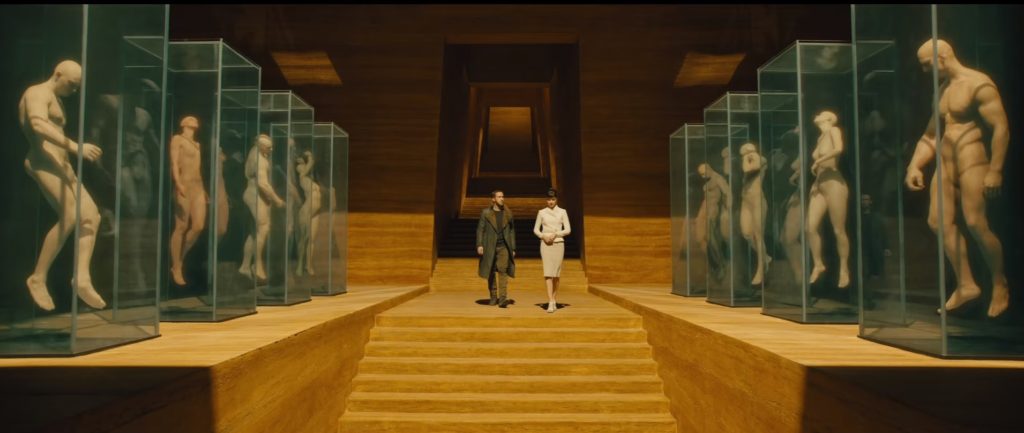
Sam: I like the idea that these robots are rebelling just by existing. It makes them seem like parasites in a system that actually needs them to survive. It’s amazingly subtle how backwards and robotic the people are compared to the actual robots.
Speaking of parasites … Jared Leto’s Niander Wallace.
I don’t want to guess irresponsibly about the behind-the-scenes decisions that led to casting Leto as the titular villain (maybe Denis was trying to impress his 14-year-old stepdaughter?), so I won’t get into the why on Earth was this decision made discussion but will try to only discuss his on-field performance.
I’ll start by trying to answer your question: I have no idea what planet Wallace is from, but I’m guessing it’s a world a lot like Earth except that it is inhabited by blind humanoids who are deeply philosophical, malicious, and don’t read scripts. Leto for sure showed up on set without having seen the original “Blade Runner” or having read anything but his own lines.
He definitely thinks he’s stealing the show with every word he says, and it’s almost entertaining how not true that is. If Gyllenhaal serves every movie he’s in by being the best actor but recognizing the star of any given scene and giving them the space to ball, then Leto is the anti-Gyllenhaal, the inverse Jake. He doesn’t care who the star is supposed to be in BR2049 because he really thinks that by the end, it’s going to be him. He steps all over a quiet and thoughtful Gosling and out-shouts old Harrison Ford. He knows a trailer line when he sees one (“happy birthday”), and he gives it the max oversell possible. Jared goes full Leto in this movie, and it doesn’t really help anyone.
That’s enough nitty-gritty.
I have no more grits to nit, but since we’re talking about bad actors, let me ask you this: Are we glad Harrison Ford came back for this? He was responsible for the coolest fight scene of the year.
Taylor: Leto is responsible for putting me in a place that I like to call “30 Seconds to Bars.” It’s the idea that any single Leto line reading or acting choice could drive everyone in the audience to a bar to start drinking in less than 30 seconds.
Harrison Ford, on the other hand, is more like “30 Seconds from Bars,” in the sense that he’s never more than 30 seconds away from a bottle containing alcohol at any point in this movie.
I presume you’re talking about his first fight scene with Ryan Gosling, and I concur: it’s dope.
The strobe lights, the intermittent Elvis interjections, the punch after punch after punch to Ryan Gosling’s pretty face (one of those was real!). The thing that I loved about it most, though, was what I mentioned on the podcast: Harrison Ford was trying! I was sure that he would be in “Star Wars” mode and be like “listen, I don’t remember filming this movie 25 years ago because I was doing a lot of drugs then and I’m cool so I have better stuff going on, so just give me my paycheck and cut me loose from this shit.”
But no! He was trying! (You can always see when Harrison Ford is trying.) And it was fun! Was he good? Not important! The fact that he committed is all that matters.
It’s like my theory about being the coolest cat on the dance floor: If you act like you know what you’re doing, people will think you know what you’re doing. And Harrison Ford loves doing that (and also not caring, what can I say, he’s a man of many contradictions).
I’d like to just spend a little time now reveling in the sheer beauty and wonder of all the early-movie Joi scenes.
*deep exhale, closes eyes, man starts yelling phrases at me (“CELLS INTERLINKED CELLS INTERLINKED CELLS INTERLINKED”)*
Sam: You know what makes you the coolest cat on the dance floor, Taylor? Not using the phrase “coolest cat.” My 8th-grade history teacher used to say “coolest cat,” and he once told us that his favorite band was a tossup between Maroon 5 and Barenaked Ladies.
Anyway, this is our last movie in the Dilliverse, so it’s only appropriate to compare how far we’ve come with the women of Denis’ work over the last nine movies (I’d add the men from his movies, too, but they are almost universally less interesting than the women*).
*with the obvious exception of Jake Gyllenhaal because I mean come on. It’s Gyllenhaal.
Here are the advanced metrics:
“August 32” – A car crash survivor named Simone. She bleeds, is able to leave her house without explicit help from Ryan Gosling, and can pee, so she gets a 10/10 on the biological human scale. But her inexplicable desire to get pregnant in Salt Lake City and her propensity to indirectly put her friends into comas lands her at a 0/10 on the humanity scale.
“Maelstrom” – Sucks and is unstudyable.
“Polytechnique” – Valérie goes through the most brutal and tragic and gut-wrenching experience of all of Denis’ characters. She just wants to be an engineer and not get harassed by her male professors or shot by a guy. In a movie where every scene is more jarring than the last, the most powerful part is when she wakes up in the middle of the night in terror only to stare herself in the mirror with dread knowing that she’s alive, years after the shooting took place. She earns a 1000/10 on the humanity scale and a 0/10 on the “how excited am I to rewatch this movie” scale.
“Incendies” – The mom survives prison at the hands of a war criminal who is also her son (and her children’s father) only to die and leave a will that basically says “violence isn’t the answer.” She earns herself a ?/10 on the “uh…what?” scale and a -5/0 on the ability to do simple math scale.
“Prisoners” – Maria Bello lays on a bed, and Melissa Leo kills a bunch of kids. Bello gets a 0/10 on the “likelihood you’ll remember she was in this movie” scale, Leo is up one-zip over Hugh Jackman, and I lose ten points for getting the names Maria Bello and Melissa Leo mixed up in my head always.
“Enemy” – Gyllenhaal’s wife gets a 4/10 on the “potential ‘Spiderman 2’ villain” scale.
“Sicario” – Emily Blunt gets a 10/10 on the “Wait, why is Jon Bernthal getting paid more than me?” scale.
“Arrival” – Amy Adams gets a 10/10 on the “not being Jeremy Renner” scale but loses 5 points for marrying him. She gets those points back when they divorce.
“BR2049” – Joi. The only character in Blade Runner with any believable emotion. She’s the least sophisticated robot by technological standards, but the most endearing by actual standards. She is a robot, so she gets 0/10 for being a human, but 10/10 for having humanity. That scene when Gos comes home and she just wants to hang out with him and cook him dinner while he smolders is the best. It’s a marriage of the creativity of Denis with the likeability of Joi. Even though she’s trapped inside a SmartHouse (TM Disney Channel) program, she’s the most … uh … joyful part about this movie to the point that it feels like a well-earned cinematic climax that she should be able to feel the rain.
R.I.P. Joi Flashdrive.
Taylor: Wow. Well said.
Now that we’ve talked at length about this movie, pop quiz!
Tell me one thing you remember about the plot.
Sam: Uhhh. Gosling is an orphan with very few toys? Harrison Ford impregnated a robot? Edward James Olmos was in this movie? Something about a landfill?
Taylor: Perfect.
Sam: Final Denis Power Rankings:
- “Arrival”
- “Prisoners”
- “Blade Runner 2049”
- “Enemy”
- “Sicario”
- “Polytechnique”
- “Incendies”
- “August 32nd”
- “Maelstrom”
The end.
